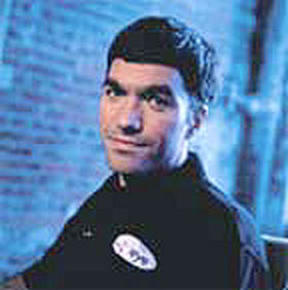The entrepreneurial quest for venture capital took a detour through Death Valley around mid-2000. The gallows humor in regard to looking for start-up funding proliferated across the Internet:
Venture capitalists would say: Submit your business plan. Well look at it.
They meant: Our recycling profits are up 18 percent this year.
Venture capitalists would tell the start-up hopefuls: Well get back to you.
They meant: We’ll give it to our intern if he doesn’t have anything else to do.
Venture capitalists say: Well need to make some small changes in your business plan.
They mean: Starting with your participation.
(From entrepreneurs.about.com)
If youve ever tried to raise a funding to start a business, the world of venture capital is confusing: elevator pitches, passive investors becoming very hands-on, savvy financiers the constantly revised Power Point business plan and so on; its the stuff of legend. I know. Both adults in my household have been on the asking side of the venture capital road show.
But good venture capital firms still thrive if the learned the art of tempering enthusiasm to only good, viable plans.
Bellevue-based Ignition, a venture capital company, is one of those companies. We wanted to learn about the new landscape of tech investing from Ignition partner Martin Tobias.
Martin knows a thing or two about giving birth to an original technology. In 1997, he and his wife Alex founded what was at the time Seattle-based Encoding.com, specialized in encoding analog media into digital media for the Internet. As LoudEyes CEO and Minister of Order and Reason, he grew the company, digitally encoding every track of music ever created, changed their name to LoudEye.com and took it to an IPO, where it continues to be traded on the NASDAQ.
Martin is still the second largest shareholder of LoudEye, but is now a venture partner with IgnitionPartners.com. From his unique perspective, he has many opinions on issues around technology trends and the companies he is now excited about as well as the current state of tech venture capital.
Q: Tell us about being a venture capitalist (VC) in Seattle.
Tobias: I started with Ignition to help my ex-Microsoft friends work on venture capital. I really enjoy the formative stages of an idea, helping people figure out the basics of a business: whats the product, who is the customer, how much to sell it for, whats the opportunity, whos your strategic partner.
Q: How does Ignition operate?
Tobias: Ignition is an early stage venture capital firm. We have two funds under management – about $450 million total management. The most recent fund is $280 million – just about 10 percent invested. I think were one of the most active VCs in Seattle last year, doing about six new deals. Were looking at the same number this year.
We invest in early-stage software and telecom. One of our partners is Steve Hooper, former president and CEO of AT&T Wireless and some other McCaw companies. We have a lot of senior Microsoft guys as the other partners. We look at traditional enterprise software companies and infrastructure software companies.
Q: I know that the current state of venture capital is in a low phase. What type of investments are you focusing on?
Tobias: We like to focus on early-stage things. Sometimes that means two or three people with an idea. We have some investments in 802.11. We invest in supply chain management companies. We have an investment in a local company called Intelligent Results (www.intelligent-results.com), which is doing unstructured data mining. They are the data mining team out of Amazon.com.
We have another company called Hynomics (www.hynomics.com). The founder invented an area of mathematics called hybrid theory and were trying to help him figure out how to apply that into software to solve business problems.
We like deep, hard problems with very good founding teams in software. We feel there are a couple of areas that are fruitful for investment. Those include very hard math problems – like Hymonics, next generation VPN, security, data center management.
We think there is some opportunity for home networking. We have a company called Pure Networks (www.purenetworks.com), which is writing software to make how you manage home networks easier.
We have another company called Consera (www.consera.com) which is doing Windows NT server administration software.
Q: What is the process now for a person to go after new venture capital? It is quite different than it was 4-5 years ago?
Tobias: Yes, I think it is. I remember back when I was starting LoudEye, I had four lines on a nap and I could raise money
Q: Im sure its gotten a little more sophisticated now.
Tobias: Its not that its more sophisticated. I think there were still a lot of good decisions made quickly on the back of a napkin. At the end of the day, as a venture capitalists, you really invest in the people at least in the early stage.
The process is to just e-mail or call me, tell me your idea – and I tell you if I want to hear it or not. Ignition is more optimistic than some. Ive talked to other VCs. They tend to fall into two categories and you need to, when youre raising money, figure out who youre planning to talk to and what category they are in.
The one category is, Ive got a big fund and a lot of investments I made in 1998-99 and they are all going south and everything stinks in my portfolio and Im really not interested in hearing any new ideas. You hear about this category a lot in the media.
The other category is one whose portfolio is not doing that bad and there are many fewer of them or ones that have new funds to invest. I put Ignition in both of those second categories. Our latest fund $280 million with only 10 percent invested was raised at the end of 2001. Were still in the generally optimistic phase, believing this is a good time to start companies, and entrepreneurs and truly innovative software ideas can still make a difference and still create a good company.
Q: What is different now in venture investment?
Tobias: Some of the things that have changed materially are the terms that you get in the price of companies. The valuations have come down significantly on how much we are willing to invest. The amount of money venture capitalists are willing to risk before they turn profitable has also come down.
I remember back in 1998-99, there were people shopping around ideas that required $100 million before you turned a profit. I dont think any investors are willing to risk $100 million before turning a profit now.
What were thinking about now especially with the software company is if you cant have a reasonable chance of becoming profitable, even on a small revenue base, in $10-15 million, its just not worth the risk. You need to stay small, focused, burn a small amount of money, get to profitability even if its only on a $5-6 million rate of revenue.
For more information about Ignition, visit www.ignitionpartners.com. To learn more about Martin Tobias, his charitable foundation and to read his Weblog, visit www.martinandalex.com.
Next week: Part II of our conversation with Martin Tobias on the future of venture capital and emerging technology companies in the Puget Sound region. The full audio interview with Martin Tobias can be heard at www.webtalkguys.com.
Dana Greenlee is co-host, producer and engineer of the WebTalkGuys Radio Show, a Tacoma-based radio and Webcast show







